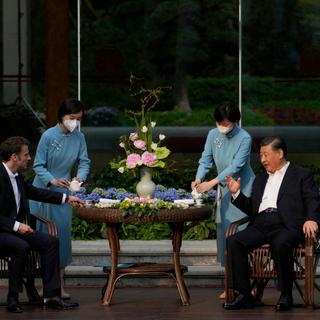


France and China share sixty years of tumultuous and unbalanced diplomatic relations
Long ReadPresident Emmanuel Macron welcomes his Chinese counterpart Xi Jinping for a state visit on May 6 and 7. It's an opportunity for Paris and Beijing to celebrate a highly political relationship and one that is increasingly tilting in China's favor.
On the black-and-white television screen, Charles de Gaulle answered journalists' questions at a press conference. After an hour devoted to domestic politics, the French president returned to the announcement made four days earlier, on January 27, 1964, on the establishment of diplomatic relations with the People's Republic of China. It was a major diplomatic turning point. He referred to "the weight of evidence and that of reason." "Needless to say, on our part, there is nothing in this decision that implies the slightest approval of the political system that currently dominates China," said the president. "France simply recognizes the world as it is."
This recognition was anything but self-evident. When Communist troops seized power and Mao Zedong proclaimed the People's Republic of China on October 1, 1949, both Paris and Washington wondered what policy to pursue. Until then, they had recognized Chiang Kai-shek's government, which had been forced to withdraw to the island of Taiwan. In mid-January 1950, Maoist soldiers seized not only the premises of the American embassy in Beijing, but also those of the Center for Chinese Studies at the University of Paris, thereby ending the debate. Other countries did not make the same choice: From the outset, the Scandinavian countries, Switzerland and the United Kingdom recognized the new power in diplomatic terms, but did not send an ambassador to Beijing.
Other events made the establishment of diplomatic ties impossible. In January 1950, China was the first country to recognize Communist Vietnam at war with colonial France. Early in the summer of the same year, the Korean War broke out, to date the only direct conflict between the US and China, and one in which France was involved, having sent a battalion. Later, Maoist China would support the Algerians' fight for independence, again in opposition to Paris.
But everything changed at the beginning of the following decade. Having emerged, not without humiliation, from its two colonial conflicts, France was no longer regarded by Mao as an Asian force. Moreover, from 1963 onwards, de Gaulle made no secret of his skepticism about Washington's desire to escalate the war in Vietnam. The hero of Free France wanted to have a say in world affairs, and to break away from the East-West bloc approach. Mao was similarly distancing himself rapidly from his Soviet big brother. He described the de-Stalinization carried out by Nikita Khrushchev from 1956 onwards as revisionist, and then, during the 1962 Cuban missile crisis, accused the Russian leader of having caved in out of fear of the American imperialists. Like Paris, which carried out its first nuclear tests in 1960, Beijing – another atomic power in the making – opposed the treaty limiting atmospheric testing, something agreed by Washington and Moscow.
You have 85.63% of this article left to read. The rest is for subscribers only.
